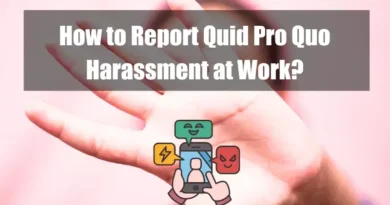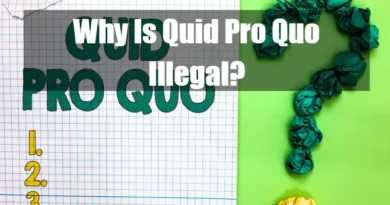Is A Favor Considered As Quid Pro Quo
A favor can be considered quid pro quo if it involves an exchange in which one party expects a return benefit for the favor given. This reciprocal nature of quid pro quo requires that both parties understand and agree upon the exchange, ensuring that each party receives something of value in return for what they provide. This concept applies across various contexts, from legal agreements and business transactions to everyday social interactions.
Takeaways
| Key Points |
|---|
| Quid pro quo, a Latin term meaning “something for something,” refers to a reciprocal exchange where one party provides a benefit in return for an equivalent value from another, embodying the principle of reciprocity that ensures fairness in transactions. |
| Historically rooted in Roman law and early barter systems, quid pro quo has remained integral in legal, business, and trade contexts to maintain equity and enforce agreements. |
| Modern examples include legal contracts, where terms are clearly defined to prevent ambiguity, and informal exchanges in personal life, like reciprocal favors between friends. |
| However, ethical and legal boundaries are crucial, as abuses of quid pro quo, such as coercion or corruption, can lead to severe consequences, including reputational damage and legal penalties. |
| While it fosters mutual benefit in many scenarios, transparency, fairness, and adherence to ethical standards are essential to ensure that quid pro quo arrangements are both effective and morally sound. |
Understanding Quid Pro Quo
What is the Definition of Quid Pro Quo?
Quid pro quo is a Latin term that translates to “something for something.” It describes a reciprocal exchange where one party provides a benefit in return for something of equivalent value from the other party. This principle of reciprocity ensures that transactions are balanced and mutually beneficial.
| Term | Definition |
|---|---|
| Quid Pro Quo | A reciprocal exchange where one item or service is given in return for another. |
| Origin | Latin phrase meaning “something for something.” |
| Key Principle | Reciprocity – the mutual exchange of goods, services, or favors. |
| Common Usage | Legal agreements, business transactions, and everyday personal interactions. |
Historical Context of Quid Pro Quo
Quid pro quo has ancient origins, rooted in early barter systems where goods and services were exchanged for mutual benefit. In Roman law, it emphasized fairness in transactions. Throughout history, quid pro quo has been integral to commercial laws and trade agreements, ensuring that exchanges were equitable and legally binding. This historical foundation highlights its enduring relevance in maintaining fairness in exchanges.
Modern Interpretations and Examples
In contemporary settings, quid pro quo manifests in various forms:
1. Legal and Business Spheres
In the legal realm, quid pro quo is essential in contractual agreements, ensuring that each party provides something of value. For example, a job offer contingent on performing specific tasks exemplifies quid pro quo in employment law. Ethical considerations are paramount to prevent potential abuses of power.
2. Political and Social Contexts
In politics, quid pro quo can lead to controversies, especially when it involves an abuse of authority. A politician offering legislative support in exchange for donations is a clear example, often scrutinized for ethical violations.
3. Everyday Life
In daily interactions, quid pro quo is evident in simple exchanges. For instance, friends may help each other with tasks, expecting future reciprocation. These informal arrangements rely on mutual understanding and balance.
| Context | Example |
|---|---|
| Legal | An employer offering a job promotion in exchange for a favor, which may cross ethical boundaries. |
| Business | Companies exchanging services or products under contract, ensuring mutual benefit. |
| Politics | A politician providing legislative support in return for campaign contributions. |
| Social/Personal Life | Friends helping each other with tasks, expecting reciprocation in the future. |
Quid pro quo is a fundamental concept ensuring reciprocity in exchanges across various domains. Understanding its definition, historical context, and modern applications is crucial for ethically and effectively navigating professional, political, and personal interactions. Individuals and organizations can maintain fairness and mutual benefit in their exchanges by recognizing and appropriately managing quid pro quo arrangements.
Legal Aspects of Quid Pro Quo

When is Quid Pro Quo Considered Legal?
Quid pro quo is legal when it involves a transparent and consensual exchange of goods, services, or favors where both parties agree to the terms. Legal quid pro quo must comply with existing laws and ethical standards, ensuring no party is coerced or exploited. The quid pro quo terms are explicitly stated in contractual agreements, leaving little room for ambiguity or misinterpretation.
For example, in a business contract, one company might agree to provide services to another in exchange for payment. This is a straightforward and legal application of quid pro quo, provided all actions comply with regulatory standards and ethical guidelines.
Examples of Legal Quid Pro Quo
- Business Contracts: A company provides consulting services to another business in exchange for a fee. The terms are clearly defined in a contract.
- Employment Agreements: An employee agrees to perform certain tasks in return for a salary and benefits. This arrangement is legally binding and mutually beneficial.
- Political Agreements: Two legislators might agree to support each other’s bills. This form of quid pro quo is legal as long as it does not involve bribery or unethical practices.
Legal Boundaries and Ethical Considerations
Legal boundaries ensure that quid pro quo exchanges do not cross into illegal or unethical territory. For instance, quid pro quo is illegal in employment if it involves sexual favors in exchange for job benefits, as this constitutes sexual harassment.
Ethical considerations involve transparency, consent, and fairness. Both parties should fully understand the terms and implications of the exchange. Unethical quid pro quo arrangements, such as bribery or coercion, can lead to legal consequences and damage reputations.
Quid Pro Quo in Everyday Life

Common Scenarios of Quid Pro Quo in Personal Interactions
In everyday life, quid pro quo is a common occurrence. Simple favors between friends or family often operate under the principle of reciprocity. For example, a person might offer to babysit for a friend with the expectation that the favor will be returned. These interactions, while informal, are based on mutual benefit and understanding.
The Fine Line Between a Favor and an Expectation
While favors can be acts of kindness, they can sometimes carry an implicit expectation of reciprocity. This expectation can blur the line between a genuine favor and a quid pro quo arrangement. The key difference lies in the intention and understanding between the parties involved. A favor given without any expectation of return is a gift, while a favor given with the anticipation of reciprocation aligns more closely with quid pro quo.
Perception of Favors as Quid Pro Quo in Different Cultures
Cultural norms significantly influence how favors and quid pro quo are perceived. In some cultures, exchanging favors is a deeply ingrained social practice, fostering community bonds and mutual support. In others, the expectation of reciprocation might be seen as transactional and less generous.
For instance, in many Eastern cultures, “guanxi” emphasizes the importance of relationships and reciprocity in social and business interactions. In contrast, Western cultures may view quid pro quo with more scrutiny, particularly in professional settings, due to concerns about fairness and ethics.
Quid Pro Quo in Business and Professional Settings

How Quid Pro Quo Operates in Business Deals
Quid pro quo is a fundamental principle ensuring that transactions are mutually beneficial. Companies often engage in quid pro quo arrangements through contracts where services, goods, or benefits are exchanged under agreed terms. For instance, a vendor might provide products to a retailer in exchange for payment or promotional opportunities.
These arrangements are crucial for maintaining trust and cooperation in business relationships. Clear communication and documentation are essential to prevent misunderstandings and ensure that both parties fulfill their obligations.
Ethical Implications of Quid Pro Quo in Professional Environments
While quid pro quo can facilitate business deals, it also carries ethical implications. The potential for abuse, such as favoritism or corruption, must be carefully managed. Ethical quid pro quo practices involve transparency, accountability, and adherence to professional standards.
For example, offering a business favor with the expectation of preferential treatment in return can create conflicts of interest and undermine trust. Organizations must establish clear policies and ethical guidelines to navigate these complexities.
Case Studies of Quid Pro Quo in Corporate Settings
- Corporate Sponsorships: A company sponsors an event in exchange for advertising opportunities. This quid pro quo arrangement benefits both the sponsor and the event organizers.
- Supplier Agreements: A manufacturer agrees to purchase materials from a supplier under specific terms. In return, the supplier offers competitive pricing and reliable delivery.
- Partnership Deals: Two companies collaborate on a project, each contributing resources and expertise. The success of the project depends on the mutual exchange of benefits.
Quid pro quo, while a simple concept, plays a vital role in legal, personal, and professional contexts. Understanding its legal boundaries, ethical considerations, and practical applications is essential for ensuring fair and mutually beneficial exchanges.
By adhering to transparency, consent, and fairness, individuals and organizations can navigate quid pro quo arrangements effectively and ethically.
Quid Pro Quo in Politics

Quid Pro Quo in Political Agreements and Negotiations
Quid pro quo is a frequent element in political agreements and negotiations. Politicians and political entities often engage in exchanges where support for legislation, policy endorsements, or other political favors are traded. This practice is rooted in the necessity of coalition-building and securing legislative success. However, the line between acceptable political negotiation and unethical quid pro quo can be thin and often contentious.
High-Profile Political Quid Pro Quo Cases
High-profile cases involving quid pro quo often attract significant public and media scrutiny. One notable example is the Watergate scandal, which exposed political favors and corrupt practices. More recently, the impeachment inquiry into President Donald Trump in 2019 centered on allegations of quid pro quo, involving the withholding of military aid to Ukraine in exchange for investigations into political rivals.
Such cases highlight the potential for quid pro quo arrangements to cross ethical and legal boundaries, leading to severe consequences for those involved. They also underscore the importance of transparency and accountability in political dealings.
Public and Legal Reactions to Political Quid Pro Quo
Public and legal reactions to quid pro quo in politics are typically strong, particularly when such practices are perceived to undermine democratic principles. Legal frameworks often impose strict penalties for corrupt practices, including bribery and coercion. Unethical quid pro quo revelations can severely damage public trust, leading to political fallout and calls for reform.
For instance, the aftermath of the Watergate scandal led to significant changes in campaign finance laws and increased scrutiny of political activities. Similarly, the Trump impeachment inquiry sparked widespread debate about the limits of executive power and the role of quid pro quo in international relations.
Negative Perceptions and Consequences
The Negative Connotation of Quid Pro Quo in Certain Contexts
Quid pro quo can carry a negative connotation, particularly when associated with coercion, corruption, or unethical behavior. It can imply favoritism or bribery in professional environments, undermining trust and fairness. The term often suggests an expectation of reciprocity that can be manipulative or exploitative.
Legal Repercussions of Unethical Quid Pro Quo Arrangements
Unethical quid pro quo arrangements can lead to serious legal repercussions. In the workplace, quid pro quo harassment, where job benefits are contingent on sexual favors, is illegal and subject to strict penalties under employment law. In politics and business, bribery and corruption charges can result from unethical exchanges, leading to fines, imprisonment, and loss of professional reputation.
The Impact of Quid Pro Quo on Personal and Professional Relationships
The impact of quid pro quo on relationships can be profound. Personal interactions can erode trust and lead to feelings of exploitation. In professional settings, it can create a toxic work environment, reduce morale, and hinder collaboration. Understanding and avoiding unethical quid pro quo practices are crucial for maintaining healthy and productive relationships.
FAQ
What are the Common Misconceptions about Quid Pro Quo
- All Quid Pro Quo is Unethical: Not all quid pro quo arrangements are unethical. Many are legal and mutually beneficial when conducted transparently.
- Quid Pro Quo is Always Explicit: Quid pro quo can sometimes be implicit, with an unspoken understanding of reciprocity.
- Quid Pro Quo Only Occurs in Politics: It is prevalent in various contexts, including business, personal interactions, and legal agreements.
How to Identify and Navigate Quid Pro Quo Situations
Identifying quid pro quo situations involves recognizing the expectations of reciprocity. Key indicators include explicit or implicit agreements where one party benefits in return for providing a favor. Navigating these situations ethically involves ensuring transparency, consent, and fairness. Clarifying the terms and implications of any exchange is important.
What are the Tips for Maintaining Ethical Standards in Quid Pro Quo Arrangements
- Transparency: Communicate the terms of the exchange to all parties involved.
- Consent: Ensure that all parties willingly agree to the terms without coercion.
- Fairness: Strive for balance in the exchange, ensuring that each party benefits equitably.
Conclusion
Understanding quid pro quo in various forms and contexts is essential for navigating ethical and legal boundaries in personal, professional, and political interactions. By maintaining transparency, consent, and fairness, individuals and organizations can engage in mutually beneficial exchanges without compromising ethical standards. This comprehensive overview provides a foundation for effectively recognizing and managing quid pro quo arrangements.









